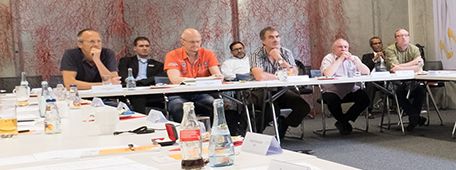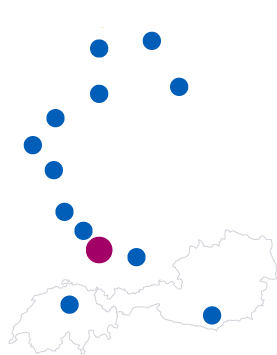City of Hof Works Department
Automated consideration of multi-shift employment model with Collective agreement public sector module
Payroll accounting for commercial employees is composed of various fixed and variable components in almost all municipal entities. These are based on the Collective agreement public sector, which is divided into monetary, time, and overtime bonuses. This was the case in the Works Department of the independent city of Hof, which has 47,000 inhabitants and is located in northern Bavaria. With around 180 employees in a variety of service sectors, the city handles a broad range of duties – from landscaping to street and sewer maintenance and waste management and disposal. The entity has been a separate department within overall city administration since 01/01/2012, and was tasked with implementing the In-House Company Ordinance as a municipal enterprise on 01/01/2013 by the city council.
Challenge
Having used the Infoma newsystem software Municipal departments since 01/01/2014, including material management as an autonomous solution, Hofer launched the go live for the new integrated module Wage types collective agreement public sector at the same time. They did not initially plan to be pilot users of the module, but this turned out to be the best approach due to the highly diverse working time models used in the Works Department. “We have service agreements with both daily flexible working hours and weekly working hour corridors,” explains Kornelia Künzel, Works Department Manager. “This is necessary because, for instance, daily flexible working hours aren’t useful for our sewer cleaning vehicles or street cleaning machines, which run on a two-shift operating model. That’s why we use a weekly corridor in those areas.”
Since variable wage components were not generated depending on working hours in the past, one requirement in the city’s development partnership with Axians Infoma was to take the complex, multi-shift employment situation into account, with its various collective bargaining agreement regulations, through an automated process. In addition, Kornelia Künzel was especially interested in the possibility of an additional presentation and evaluation of personnel movements, and with managing time accounts. Once implemented thanks to intensive collaboration between Hof users and provider Axians Infoma, these functions are now available as standard features to all process users in the Collective agreement public sector module.
Solution
Today, the solution is used for all staff work time logging within the Hof city Works Department. Each employee submits a paper activity report every day, which is recorded in Utilities. The Collective agreement public sector automatically generates both fixed and variable wage components and transmits them – after a logic check by the responsible employee in administration for the municipal enterprise – digitally to external personnel management for payroll accounting.
However, recorded working hours also serve as the basis for overall order processing. “In addition to clearing items for resources used like vehicle and machine hours, item consumption, external invoices, etc., we use our employees’ recorded working hours to invoice our contractors,” Kornelia Künzel explains. Recorded hours are automatically used for billing.
Benefits
After several years of practical use, Kornelia Künzel and her employees are satisfied with the Collective agreement public sector module and the implementation of their requests by the Axians Infoma team. “We saw significant improvements in comparison to previous solutions. The automatically generated bonuses and the illustration of all relevant time accounts make our work easier,” the Works Department Manager concludes positively.
The Hof city Works Department uses different working time models for its roughly 180 employees + 15 trainees
Key data
Product Personnel & Collective agreement public sector
State Bavaria
Number of inhabitants
47.500
Autonomous use of the Infoma newsystem process Municipal departments since 01/01/2013, and Collective agreement public sector module since 01/01/2013


























